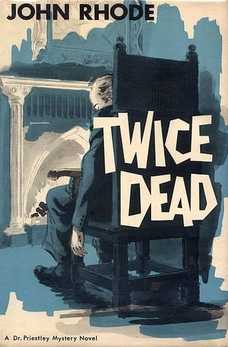
The slightly hypochondriacal Sir Francis Yordale has stumbled upon a creative method to test the loyalty of his would-be heirs: he places his own death notification in The Times and waits to gauge the response of his relations. The result is wreaths (nearly) all around, although the quality and expense vary between senders, a fact which Sir Francis is pleased to note.
As Jimmy looks into this puzzle with the help of Dr. Priestley and his apprentice Harold Merefield, the suspects descend to hear the will read. Surprisingly, the chief beneficiaries are not Sir Francis’s estranged brothers and sisters, but instead his godson George Pawlett – who had been living in Australia before the fake death notice brought him back to Uplands – and housekeeper Ethel Shirland inherit the lion’s share of the estate. This does not sit well with Edgar Yordale, the natural successor (and a man who had conceitedly adopted the baronetcy’s title upon learning of the false report of his brother’s death). Charles, Jane, and Mary Yordale seem to take the news more pacifically, although they may be harboring a secret grudge.
An attempt on (the now Sir) Edgar’s life focuses suspicion on family outsider George Pawlett. He was staying in the house the night of Sir Francis’s murder, and he could reasonably lose his claim to inheritance if Sir Edgar contests the will, which he had threatened to do. When Sir Edgar is shot at with an antique pistol on the street one foggy night, Jimmy feels like the case against Pawlett is overwhelming: the pistol was part of a set at Uplands, and the unfortunate Australian had access to it while he stayed with his godfather. But Dr. Priestley cautions his police friend not to reject other possibilities, and soon another scenario suggests itself to Jimmy Waghorn (and one that the reader has likely arrived at well before the Superintendent has).
The John Rhode and Miles Burton books are undeniably steady, solid representatives of the Golden Age Detective fiction genre. For me, their strengths also contain the thread of their inherent weaknesses: they are precisely plotted affairs, with the detective focused exclusively on solving and explaining the mystery puzzle at the center of the story; the characters/suspects act strictly within the confines and expectations of the genre; the plots are meticulously fair-play; and the whole reading experience offers the welcome familiarity of company with a likeable but predictable friend. (With society’s shift from active reading to passive viewing, binge-watching television shows have supplanted for many the “comfort” that returning to the rhythms of a reliable fiction genre used to provide.)
Over the years, I have read my share of the Rhode/Burton books, and they are always agreeable but never revelatory… but who is asking for a detective story to deliver artistic revelations and thematic illuminations which are the presumed components of Great Literature? Would they not just get in the way? Part of the charm of classic British mystery is the recognition of familiar elements, from plot to characterization to its justice-will-prevail theme.
Twice Dead benefits from a mischievous murder victim and a clever murder method, admirable in its simplicity. Still, the delivery of the story, from its practical, unremarkable prose to its deliberate pacing, leaves me a little restless for something more from a mystery, whether it’s Margery Allingham’s quirky penchant for description or Anthony Berkeley’s sharp thematic irony or Agatha Christie’s flair for misdirection. Perhaps that is unfair to John Rhode, a reliable tradesman in this field, and especially unfair as a criticism of Twice Dead, which is an agreeable book far better than the late-period entries produced by some authors. But ultimately it’s the reason why I don’t come rushing back to the Rhode/Burton canon with the same devotion that I show for the books of Gladys Mitchell or Nicolas Freeling, eager for more: I know with each outing what I’ll be getting and where I’ll be going, and sometimes that’s the less exciting Rhode – er, road – to travel down.
Thanks yet again to Rich at Past Offences for suggesting a new year of detective fiction each month to explore; this time it was 1960. Check out the Crimes of the Century section for some spirited community criticism and classic crime suggestions!
 RSS Feed
RSS Feed